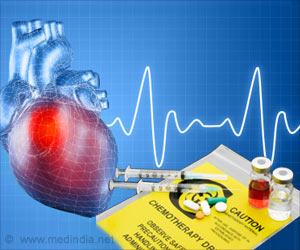- Home
- Editorial
- News
- Practice Guidelines
- Anesthesiology Guidelines
- Cancer Guidelines
- Cardiac Sciences Guidelines
- Critical Care Guidelines
- Dentistry Guidelines
- Dermatology Guidelines
- Diabetes and Endo Guidelines
- Diagnostics Guidelines
- ENT Guidelines
- Featured Practice Guidelines
- Gastroenterology Guidelines
- Geriatrics Guidelines
- Medicine Guidelines
- Nephrology Guidelines
- Neurosciences Guidelines
- Obs and Gynae Guidelines
- Ophthalmology Guidelines
- Orthopaedics Guidelines
- Paediatrics Guidelines
- Psychiatry Guidelines
- Pulmonology Guidelines
- Radiology Guidelines
- Surgery Guidelines
- Urology Guidelines
Men have worse chemotherapy-induced cardiomyopathy than women

Washington D.C.: A study, presented at EuroCMR, says that chemotherapy-induced cardiomyopathy react more on men than women.
"Cancer patients are living longer because of improved treatment but the side effects of treatment include cardiovascular morbidity and mortality," said lead author Dr Iwan Harries, from the University of Bristol, UK.
A 2016 European Society of Cardiology (ESC) position paper on cardio-oncology described female sex as a risk factor for developing cardiotoxicity from chemotherapy.
Dr Harries said, "The data largely originates from paediatric populations and, in contrast, animal studies report male susceptibility to cardiomyopathy."
This retrospective observational study in adults investigated whether there was a sex effect on chemotherapy-induced cardiomyopathy. The researchers identified all patients over a six year period that received potentially cardiotoxic chemotherapy, were referred for CMR, and were found to have impaired left ventricular function (chemotherapy-induced cardiomyopathy).
Patients were excluded if they had another condition that could have contributed to the cardiomyopathy such as ischaemic heart disease, valvular heart disease, family history of cardiomyopathy, or excess alcohol consumption.
The study included 76 patients (45 women and 31 men). Data was collected on baseline demographics and comorbidities. Details of the cancer treatment were recorded, including the type of chemotherapy, dose of chemotherapy, and the interval between receiving treatment and having the CMR scan. CMR scans provided information on left and right ventricular function, cardiac volumes, and tissue characteristics.
To assess the potential impact of gender on the development of chemotherapy-induced cardiomyopathy, the researchers conducted a multivariate regression analysis correcting for baseline differences between men and women including age, body surface area, comorbidities, and treatment.
The researchers found that both left and right ventricular ejection fraction was significantly lower in men than women, indicating worse performance of the heart. Cardiac volumes and mass were significantly larger in men compared to women, indicating more damage to the heart's structure.
Dr Harries said, "The results of our study suggest that men developed a more severe form of chemotherapy-induced cardiomyopathy than women at follow-up of 8.75 years. Patients receiving anthracycline received on average 240 mg/m2 of doxorubicin or equivalent, a dose which was similar in both men and women."
He said, "Ours is a preliminary result and large scale trials are needed to confirm our finding that men are more susceptible to chemotherapy-induced cardiomyopathy than women. If confirmed, the implication of these findings is that cardiologists and oncologists could devise individualised treatment and monitoring strategies for their patients that take gender into account."
"Cardio-oncology is a new field of cardiology that is rapidly developing thanks to oncology treatments being more efficacious and oncology patients living longer but with associated cardiovascular morbidity and mortality due to cardiotoxicity," Dr Bucciarelli-Ducci, principal investigator of the study concluded.

Disclaimer: This site is primarily intended for healthcare professionals. Any content/information on this website does not replace the advice of medical and/or health professionals and should not be construed as medical/diagnostic advice/endorsement or prescription. Use of this site is subject to our terms of use, privacy policy, advertisement policy. © 2020 Minerva Medical Treatment Pvt Ltd